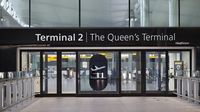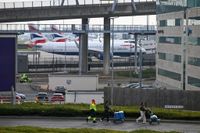On March 21, 2025, Heathrow Airport, one of the world's busiest travel hubs, was thrust into chaos following an explosion and subsequent fire at an electrical substation. As a direct result of the blaze, the airport announced it would remain closed throughout the day, complicating the travel plans of hundreds of thousands of passengers.
According to Heathrow Airport, "The airport will be shut all day on Friday, 2025-03-21, due to a blaze at an electrical substation near Heathrow." This dramatic turn of events not only left travelers stranded but also forced a staggering 1,350 flights to be canceled, impacting approximately 200,000 passengers globally. The airport has warned that disruptions will continue over the coming days, advising that "passengers should not travel to the airport under any circumstances." Since the cause of the incident is still under investigation, questions regarding the reliability of critical infrastructure have surged.
The closure of Heathrow is more than just a logistical challenge—it serves as a glaring indicator of the underlying vulnerabilities within Britain’s infrastructure. Many have pointed out that such a pivotal transport hub, which handles an immense volume of air traffic daily, should have robust contingency plans to manage potential outages. Critics are now scrutinizing how an incident of this magnitude could occur, especially in a nation that boasts advanced technological capabilities.
As flights were canceled and travel plans thrown into disarray, the incident sparked conversations in media and political circles about Britain’s broader economic and infrastructural health. The Sun, in its commentary, noted, "Whatever its cause, yesterday’s mayhem is a sign of a country in deep trouble." The article further elaborated on existing governmental inefficiencies, highlighting the burden of increased taxes and rising prices affecting citizens.
In an environment where public services are under scrutiny, the British economy is grappling with significant challenges. Many households find themselves under financial strain, as rising bills and service inefficiencies continue to mount. Reports suggest that such turmoil extends beyond the realm of travel, encompassing all facets of daily life—including the public sector, where employment and salaries are viewed critically.
For instance, commentary regarding the new GB Energy organization pointed to considerable waste, with one individual reportedly set to earn a staggering £525,000 for just two days of work per week. As described in The Sun, this has sparked outrage: "This country is run by politicians who dish out lavish salaries like sweets to public sector fatcats," indicating a disconnect between fiscal realities and the lavish compensation of public figures.
The growing dissatisfaction with the current state of affairs culminates in a larger narrative—are the leadership figures in charge capable of addressing these systemic issues? As the closure of Heathrow serves as a microcosm of the nation’s infrastructural inadequacies, the questions remain: how prepared is the UK for crises, and what can be done to safeguard vital infrastructure?
As travel turmoil continues and passengers are left without recourse, there’s a pressing need to reassess existing protocols and to ensure that contingency measures are not just theoretical but practical. With the alarming warning of continued disruptions looming, one can only hope that the voices of passengers and citizens alike will resonate through the corridors of power, prompting necessary reforms for a more resilient framework.
The Heathrow incident further amplifies concerns regarding national security; critiques hint that if such an explosion can cause this level of disruption, it raises alarming questions about complacency in safeguarding against accidents or potential sabotage. For instance, opposition political figures, aware of the implications, have expressed their disbelief. The incident draws parallels to the government’s precarious position on national security matters, particularly in the wake of rising geopolitical tensions.
Consequently, the spotlight on Heathrow can ignite discussions about the broader implications of governance, how resources are allocated and, ultimately, how prepared the UK is to confront substantive threats to both its infrastructure and its economy. The ongoing turmoil highlights the urgency to examine and rectify potential oversights in infrastructure management and crisis preparedness.
In this moment of upheaval, the British public is left watching, waiting, and hoping for swift restoration at a time when confidence in established systems is tenuous at best.


